
Also: Gallery, Board Layouts
Since the Linistepper is an open source project, users can easily modify
the code or hardware to support thier needs. A few have taken the time to
share thier favorite mods:
The Linistepper Equatorial Drive: Roman and
ceefna^ made
an Equatorial Stepper Drive for taking long
exposure pictures of the stars.
Hazimin
Fauzi^ has
translated the Linistepper asm code into
SDCC^
C with some variations:
-
Automatic low power mode after timeout instead of manual high/low power input.
-
Coil current tables are all in EEPROM
-
No support for run time mode changes
There are two versions:
Max Ries: two modes (3600 and 400 step/rev) w/
on the fly switching and available IO.
The LiniClock project: Roman created a
very nice clock with hand moved by a stepper motor. The code to keep track
of time fit nicely into the Linisteppers PIC along side the stepper drive
code.
OCNC says:
I made a mechanical modification to the Linistepper {ed: version 1, this
sort of mount is more or less the default for version 2} by installing
3-position female headers (digikey S7036-ND) where the TIP 122's go. I then
took the heatsink from a Masscool CPU Cooling Fan
(tigerdirect item #S457-1111) and drilled and tapped four holes into
it at 1/2" centers and 9/16" up from the edge. I also drilled and tapped
two holes on the fin surface of the heatsink (lies coplanar with the circuit
board). These holes line up with the two outer TIP holes and are 19/32" from
the heatsink edge (same edge that the TIP holes are referenced from). They
also are drilled and tapped to a depth to penetrate two fins. The stand off's
were cut from 1/4" aluminum tubing to a finish length of 9/16". The screws
used are all #4-40.
The ones holding the TIP's down are 3/8" long and the two for the stand off's
are 1" long. Following the best mechanical practise I used a lock washer
and flat washer under the head of each screw. Belleville washers are recommended
for the TIP's but they seem too expensive at $.50 each so I used split ring.
I rubbed the backs of the TIP's on a sharp file to get the best contact surface
possible. I also filed the mating heatsink surface and then polished it with
some steel wool. In place of mica and paste I used Berquist silicone heat
pads (digikey BER220-ND). With 1A steppers at 24V I'm unable to detect by
touch any heat rise in the TIP's.
I feel that this is a better solution than the bracket that the kit suggests
because it eliminates a heat transfer junction and it allows for very easy
replacement of the TIP's. Also if you have to drill and prepare a piece
of angle for a bracket why not just do the same right on a fan cooled heatsink?
The small cost of the additional parts seems insignificant compared to the
utility of the final product.
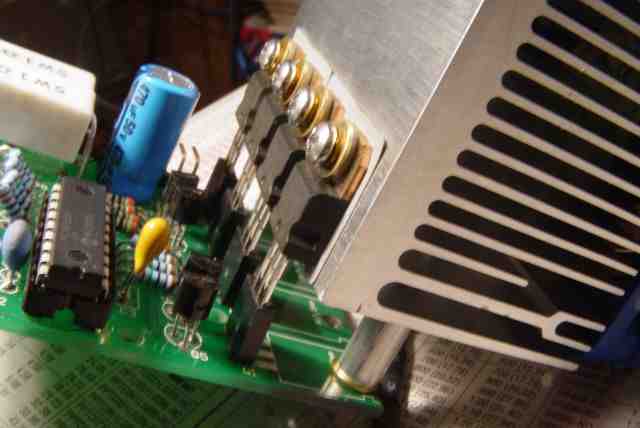
J.R. Hatcher says:
I included a few pictures, one is my invention to hold the board while soldering,
it's fast because it's just laying in the groove very loose, yet it holds
it flat and off the table.
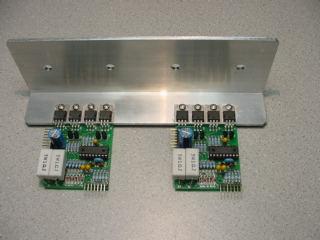
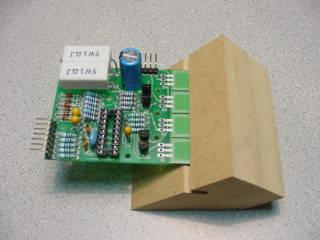
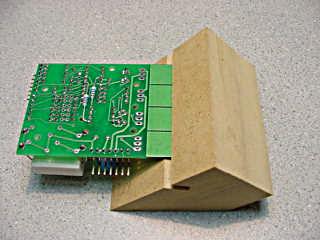
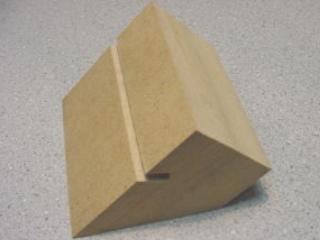
{Ed: Some people like to make thier own linistepper PCBs. The Linistepper
is an open source project and we enjoy seeing people take advantage of that
when they are able. The people listed here were also kind enough to share
thier board files and we've agreed to host them here. If you aren't big on
makeing your own PCBs, do keep in mind that we sell the
PCB for less than you can pay a board house
to make them and the kit of all parts (including
the pre-programmed PIC) is less than what you can buy the parts for from
any supplier.
Siniarsa Dewanata posted this very nice layout for the Linstepper version
2.
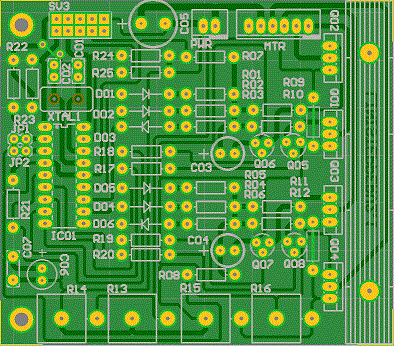
LiniStepper-SiniarsaDewanata.zip
Murat Sakman posted an alternate layout for the Linistepper Version 2 on
the Linistepper facebook group:
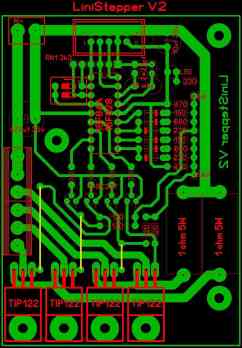
LiniStepper-MuratSakman.zip
The only concern we have with that layout is that the transistors should
be spread apart so they have more surface area on the heatsink to dissipate
all the heat. And perhaps they should be standing up, rather than laying
down, to allow direct connection to the heatsink. Other than that, this is
a very nice single sided layout, with only a few jumpers. Nice work!
Iwan Tejasukmana says: "Apparently the layout by Murat Shakman changed the
step and direction pin. I retraced the layout with schematic and found this
alteration."
Patricio Oholeguy says:
i just made an interesting improvement to posix version of the Linistepper
by aligning the transistors and a few things more.
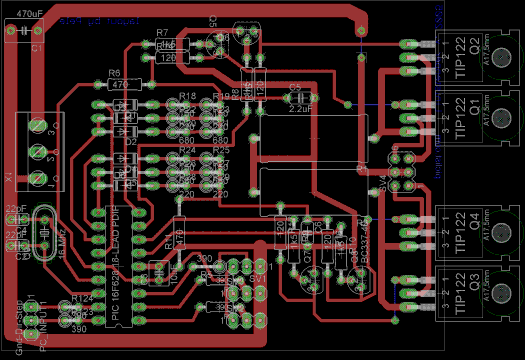
Linistepper
with aligned transistors.zip
Posix says:
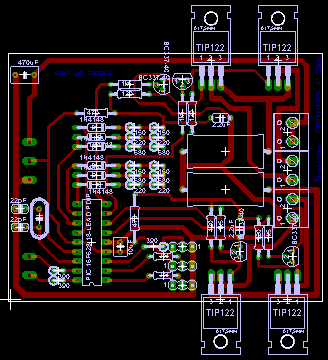 Well folks I have completed my drivers,
the knee-mill and I can tell you that linistepper and dremel can dig into
a piece of pine like hot knife through butter! I just did some engraving
on the back piece of a pcb and it works nice. I even made a mistake of inputting
-2mm rather than -0.2mm and it just dug into the pcb and started writing.
So I can conclusively say that linistepper with 1.2A step-syn motors works
like a charm! I'm using a 12v ATX PSU and an additional $5 12v computer case
fan is blowing across the linistepper to provide some fresh air to those
alu coolers.
Well folks I have completed my drivers,
the knee-mill and I can tell you that linistepper and dremel can dig into
a piece of pine like hot knife through butter! I just did some engraving
on the back piece of a pcb and it works nice. I even made a mistake of inputting
-2mm rather than -0.2mm and it just dug into the pcb and started writing.
So I can conclusively say that linistepper with 1.2A step-syn motors works
like a charm! I'm using a 12v ATX PSU and an additional $5 12v computer case
fan is blowing across the linistepper to provide some fresh air to those
alu coolers.
I can tell you that at 200 steps you get your standard driver with all the
buzzing and vibrations of any other full step driver. 400 improves somewhat
and brings a smile to a newbie.
1200 is where the action begins and a big grin materialises on anyones face
who is used to steppers buzzing and jumping and vibrating. If anyone say
the gecko video of mariss drawing that spiral will immediately know what
I'm talking about.
The linistepper really is good value for money, whether you build it or buy
it from piclist.com. The reason I didn't buy mine from james are twofold,
first they would've gotten "lost in the post" and second educational value.
For someone who burns their fingers on a soldering iron regularly then, by
all means, purchase a finished quality item from james at piclist.
Linistepper-review.brd
Linistepper-review.sch
Here are Posix's boards hard at work. Notice that the heatsinks are missing!
Posix promises to add them when he starts doing prolonged runs. His steppers
are small and he is using an underpowered supply so the power drivers are
not being stressed to much, but they WILL over heat if he isn't carefull.
That CNC machine is Posix's own design and very nicely made.}
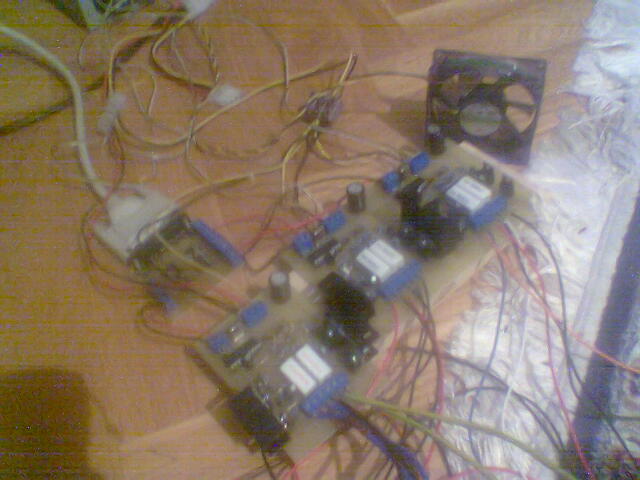
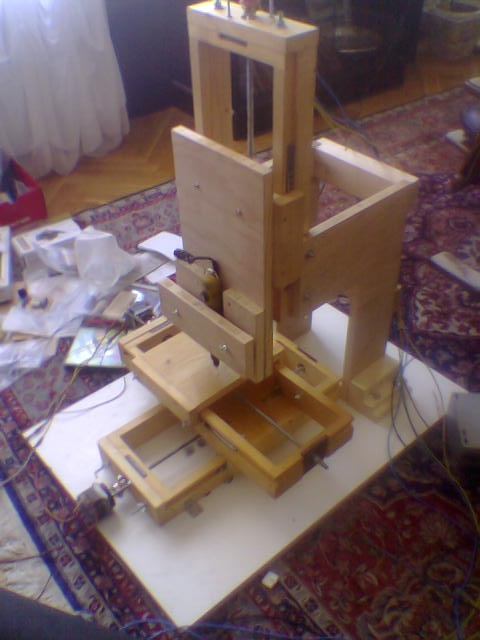
Questions:
file: /Techref/io/stepper/linistep/mods.htm, 12KB, , updated: 2017/7/19 13:17, local time: 2025/10/17 23:53,
216.73.216.53,10-2-207-162:LOG IN
|
| | ©2025 These pages are served without commercial sponsorship. (No popup ads, etc...).Bandwidth abuse increases hosting cost forcing sponsorship or shutdown. This server aggressively defends against automated copying for any reason including offline viewing, duplication, etc... Please respect this requirement and DO NOT RIP THIS SITE. Questions?
<A HREF="http://techref.massmind.org/Techref/io/stepper/linistep/mods.htm"> Linistepper, Open Source Stepper Controller Modifications, Stepper motor, </A> |
| Did you find what you needed?
|
| |
Welcome to techref.massmind.org!
|
.








 Well folks I have completed my drivers,
the knee-mill and I can tell you that linistepper and dremel can dig into
a piece of pine like hot knife through butter! I just did some engraving
on the back piece of a pcb and it works nice. I even made a mistake of inputting
-2mm rather than -0.2mm and it just dug into the pcb and started writing.
So I can conclusively say that linistepper with 1.2A step-syn motors works
like a charm! I'm using a 12v ATX PSU and an additional $5 12v computer case
fan is blowing across the linistepper to provide some fresh air to those
alu coolers.
Well folks I have completed my drivers,
the knee-mill and I can tell you that linistepper and dremel can dig into
a piece of pine like hot knife through butter! I just did some engraving
on the back piece of a pcb and it works nice. I even made a mistake of inputting
-2mm rather than -0.2mm and it just dug into the pcb and started writing.
So I can conclusively say that linistepper with 1.2A step-syn motors works
like a charm! I'm using a 12v ATX PSU and an additional $5 12v computer case
fan is blowing across the linistepper to provide some fresh air to those
alu coolers.

